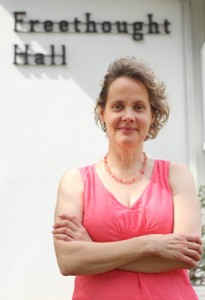By Kimberly Winston
(RNS) A federal court of appeals rejected a case brought by an atheist organization that would have declared tax-exempt clergy housing allowances — often a large chunk of a pastor’s compensation — unconstitutional.

“This is a great victory for fair treatment of churches,” said Luke Goodrich, deputy general counsel for the Becket Fund for Religious Liberty, which filed an amicus brief on behalf of pastors from several major denominations.“When a group of atheists tries to cajole the IRS into raising taxes on churches, it’s bound to raise some eyebrows,” he said. “The court was right to send them packing.”
Thursday’s (Nov. 13) ruling overturns a 2013 decision by U.S. District Court Judge Barbara Crabb, who had ruled that the exemption “provides a benefit to religious persons and no one else, even though doing so is not necessary to alleviate a special burden on religious exercise.”
But the Freedom from Religion Foundation, a Madison, Wis.-based First Amendment watchdog group that has pursued the case since 2011, vowed to fight on.
“We are disappointed but we are not giving up,” said Annie Laurie Gaylor, FFRF’s co-president. “We are so clearly right and the law is so clearly unconstitutional.”
The Chicago-based 7th U.S. Circuit Court of Appeals overturned Crabb’s ruling in favor of the atheists because it found Gaylor and FFRF lacked “standing” — meaning they had no right to sue because the law did not affect them.
Gaylor and Dan Barker, her co-president and an ordained minister, did not seek a housing allowance for themselves under the law.
“Dan took the allowance when he was a minister, but now that he is head of the largest atheist and agnostic organization in the country, he cannot take it,” Gaylor said. “That clearly shows preference for religion.”
Churches routinely designate a portion of a pastor’s salary as a housing allowance. So, for example, a minister who earns an average of $50,000 may receive another third of income, or $16,000, as a tax-free housing allowance, essentially earning $66,000. Having to pay taxes on the additional $16,000 ($4,000 in this case), would mean a 6 percent cut in salary.
The exemption is worth about $700 million per year, according to the Joint Committee on Taxation’s Estimate of Federal Tax Expenditure.
Supporters of the tax break say it helps alleviate government costs for social services by routing that assistance through houses of worship. Tony Perkins, president of the Washington-based Family Research Council, said “society has tried to relieve the clergy’s housing burden because of the tremendous social benefits churches offer the culture.”
Most clergy, he said, “despite their exceptional educations, receive only modest salaries.”
The Orthodox Union, which represents Orthodox Jews, noted that the housing allowance helps many rabbis live in homes they might not otherwise be able to afford because “congregational rabbis and other clergy members must reside within walking distance to their synagogues” because observant Jews do not drive on the Sabbath or most holidays.
Gaylor said FFRF was reconsidering its legal options and would not drop the case. The only venue left to hear the case would be the U.S. Supreme Court.
“We are regrouping,” she said.
Kimberly Winston is a freelance religion reporter based in the San Francisco Bay Area. She covers atheism and freethought for RNS.



Well my goodness, the taxpayer has been offering subsidies for all manner of professions. Check into the benefits congressional people get. Why…? The earliest elected leaders to congress had to have traveled by horse and carriage to get the halls of congress. Huge expense just to meet for congressional meetings. Voila! The housing allowance was provided.
As far as I know Dan’s not going after the military housing allowance for military Chaplains, but then of course, I don’t believe that Dan ever served a day sacrificing anything for his country. But I do believe brother Darrel served in the Marine Corps.
Dan argues that he used this allowance when he practiced as a minister, but can’t do so now. Where was his principled stand then? How much money does his non-profit send to Uncle Sam? Dan Barker is not the standard of what other people must submit to. The facts are that most people still believe in God. Anyone who crosses Dan gets a threatening letter from his lawyers. Take responsibility for your own “Don’t quote me Bro”! I suggest others look at the YouTube video by that title. What a glimpse at integrity.
The FFRF is quite simply a bully that extorts our educational institutes. They are quite aware that most school districts don’t have the funds to exhaust in court litigation because if they do… imagine, students suffer. I’m so glad for the Liberty Institute.
But in any case, their real motives are clear. They aren’t just looking for what they call constitutional fairness and justice, they are looking to belittle people who have faith. Attack after attack. Here is the latest (as far as I can tell) offering from Dan’s wife: “Let’s hear it for biblical blasphemy!” Then there are Dan’s musical offerings that mock Christian’s traditional music that is most sung by children. Dan, you once wrote a lovely musical “Mary had a Little Lamb” and now you portray “Yes, Jesus loves me” with disdain. Mockery is his stock and trade.
Here we see the truth of their work and repeated attempts to belittle people of faith…according to their website they have more than 20,000 members. 30+ years of bullying people. What a legacy!
Being a pastor, I can say from experience that the housing allowance is not entirely “tax free.” Pastors must still pay Social Security tax on this portion of their income and any portion of the allowance that is not used for IRS-approved housing-related purposes (or cannot be documented as having been used for that purpose) must be added back into the pastor’s taxable income for the year the allowance was given.